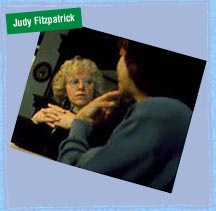


|
FDU President J. Michael Adams, an expert in career paths, estimates that individuals now starting out in their careers will have to completely retrain three times over the course of their productive work lives, and many of them will return to colleges and universities to do so. In fact, the American Association of University Women states, “Students over 40 represent the fastest-growing age group in postsecondary education.” Almost half of men and women returning to college from the world of work do so to train for a completely different line of work. FDU student Judy Fitzpatrick is in the process of making just such a radical career transformation. A physical therapist for 28 years, Fitzpatrick recently became frustrated by changes in the health care system and the way physical therapy is delivered. “I am able to spend less and less time with the patients,” she says. “I often feel this is compromising me as a therapist.” The pace of patient visits has almost doubled since she started in the field, and, because the demands of therapy can be physically taxing, she finds her part-time job as tiring as when she used to work 40–50 hours per week. “I’m 52 years old, and I don’t want to be stuck wondering what else I am capable of,” Fitzpatrick says. “I have a friend from Taiwan who asked me to help her improve her English,” she relates. “What I was able to do for her really aroused my interest.”
Fitzpatrick decided to further test the waters. “There is a Literacy Volunteers of America program offered through my public library, so I volunteered for them and worked with a Japanese student. This showed me just how inexperienced I was.” She realized then that formal education was the key to making a career switch. So, she enrolled at FDU in September 1998 to earn a degree in teaching English as a second language. “I need to be able to evaluate students’ proficiency so I know how to approach their problems. I also need to know how people learn language,” Fitzpatrick says. “I need to know the proper methodology — what is the most effective way of teaching — and I need to be able to organize a presentation and make lesson plans.” Fitzpatrick won’t be giving up all that she has learned as a physical therapist, however. Her career in physical therapy started out with some important lessons she will carry with her. “I was exposed to people with permanent and chronic conditions — things I was not going to make go away. I had to learn to help people live with what they have. I went from thinking of myself as a magician/healer to thinking of myself as a teacher, supporter and facilitator. I teach my patients all the time. In a way, lesson planning parallels goal setting with the patient in physical therapy.” |
|
|
Fitzpatrick also has developed insight into different cultures. During her six years at Columbia Presbyterian Hospital in New York City, she served a large Latino population. She even studied Spanish to communicate effectively with them. Her current job has exposed her to a large Asian population as well. In addition to studying for a degree, Fitzpatrick knows, as Adams suggests, that an internship is another good way to learn a new field. “I need to get into an internship. My interests are in working with adults, not in a traditional school system.” Fitzpatrick has already done a practicum at Bergen Community College’s adult learning center in Hackensack and hopes this may lead to a part-time teaching job in the spring. “I sometimes feel anxious going from a field in which I feel so confident to something new,” she relates. “I feel like I’m back at the bottom level. But I know I can do this and, with more experience, confidence will come.” |
|
|
Back to “A Great Adventure” |
||